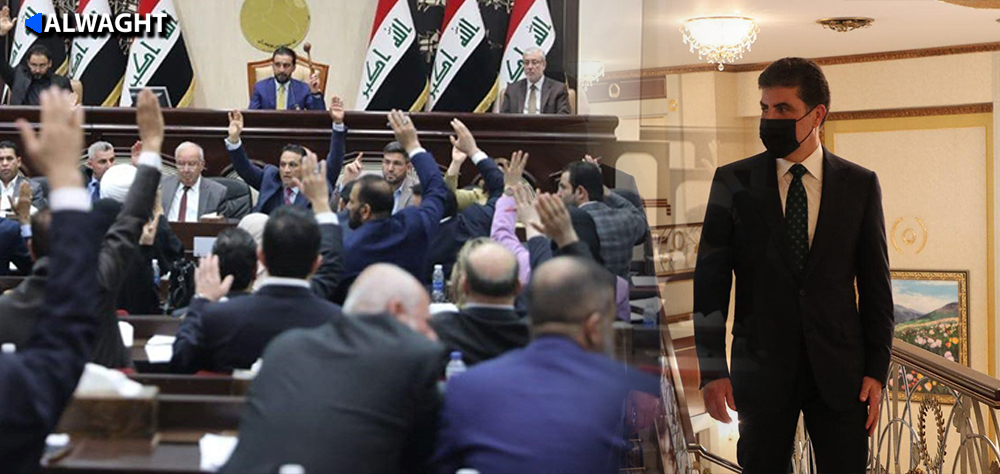Alwaght- The visit to Baghdad of the Iraqi Kurdish region's President Nechirvan Barzani shortly after approval of the 2021 federal budget and determination of the Kurdish region share is specially important to bring in spotlight. Meanwhile the important issue is his meetings with heads of various political factions, in addition to meeting senior central government officials and representatives of foreign organizations.
Barzani met with Prime Minister Mustafa al-Kadhimi, President Barham Salih, Speaker of the Council of Representatives Muhammad al-Halbusi, President of the Supreme Judicial Council Faeq Zaidan, the visiting Arab League Secretary-General Ahmed Aboul Gheit, and the UN representative to Iraq. He also talked to representatives of the political parties.
Here is a question: What were Barzani visit's goals and achievements?
Focusing on solving Erbil-Baghdad disputes
The first and perhaps the rimary purpose of the visit of Kurdistan Regional Government's president to Baghdad is to focus on resolving the dispute between Erbil and Baghdad, existing at various levels since 2005. Budget, oil production and sales by the autonomous region, the "disputed regions", and the customs revenues have been source of disputes between the two sides over the past years, though negotiations and agreements were made— the most important of which is a recent deal according to which Baghdad agreed to pay the Kurdish region's share from federal budget in return for delivery to the central government the Kurdish oil sales revenues and half of the customs incomes.
In the current context, the visit to Baghdad can be seen as a new attempt by the Kurds to resolve their differences with central government and possibly strike a deal with the government of Mustafa al-Kadhimi on new, and primarily security, levels. In fact, Barzani, as a moderate figure in the Kurdistan Democratic Party (KDP), has always had a positive view of strengthening relations and resolving differences between the two sides, and Baghdad officials are happy to receive and talk to him in the capital.
Trying to make friends in the parliament
In addition to trying to resolve the disputes between Erbil and Baghdad, perhaps the most important hidden dimension of Barzani's trip, which has been overlooked by political observers, is Erbil's attempt to make allies in the Iraqi parliament and develop influence in the political factions.
The Iraqi Kurdistan has had agreements with various prime ministers in Baghdad at various times, but the parliament blocked their implementation. One example is al-Kadhimi’s agreements with KDP leaders over the past few months, which have been severely criticized by members of parliament and have faced major obstacles in its way to materialization.
As the mainstay of power in the Kurdish region, the KDP thinks that in addition to the government figures and political leaders, it needs to build influence within the parties and subsequently the parliament to maintain the agreements and engage with the central government. Barzani's busy schedule of meetings with party leaders and representatives in Baghdad from a set of parties bears witness to this Kurdish vision.
On day one, he met Labor Coalition leader Salim Jobouri, previous PM Adel Abdul Mahdi, Islamic Supreme Council head Humam Hamoudi, National Accord Party head Ayad Alawi, and Determination Alliance chief Khamis Khanjar. Meeting leader of National Wisdom Movement Ammar al-Hakim, leader of the Salvation and Development Front Osama al-Nujaifi, chairman of the Rule of Law Coalition Nouri al-Maliki, leader of the Fatah Coalition Hadi al-Amiri, leader of the Al-Nasr Coalition Haidar al-Abadi, and the representative of Sadr Movement Nasar al-Rubayee took place on the second day.
This wide range of meetings with politicians made it clear that Barzanis have put high on their agenda closeness to the parliamentary blocs and figures. This closeness has its specific goals, indeed.
Seeking assurance for new Baghdad-Erbil agreements
Lying behind Barzani's efforts to promote contacts and ties with the parliamentary blocs is a glimpse at getting adequate assurances for implementing new Baghdad-Erbil agreement. Barzani family, which is of high influence in the Kurdish region, thinks that if the agreements are implemented and budget share is regularly sent to Erbil, they can claim credit for this triumph that will give their political base a new boost. Barzani came clean about Erbil's readiness and willingness to settle problems with Baghdad according to the constitution.
"We all made mistakes and must open a new page in Iraq; one with a new shared vision for the future to solve problems and learn from past experiences and errors," he told Baghdad leaders.
Translation of his remarks: Kurdish leaders made a historic mistake pushing forward the independence referendum in 2017 and now want guarantees that budget share will be sent regularly to Erbil.



























